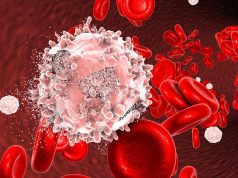Risk for breast cancer-related death and odds of mastectomy were higher for symptom-detected cancer
By Elana Gotkine HealthDay Reporter
THURSDAY, June 5, 2025 (HealthDay News) — For patients aged 40 years or older, screen-detected breast cancer is associated with lower odds of advanced cancer, mastectomy, and breast cancer-related death, according to a study published online May 30 in Radiology: Imaging Cancer.
Javeria Munir, M.D., from the University of Ottawa in Ontario, Canada, and colleagues conducted a retrospective observational cohort study involving consecutive women aged 40 years or older diagnosed with breast cancer between January and December 2016 to examine the impact of method of detection (screen-detected versus symptom-detected) on pathologic stage, surgical treatment, and chemotherapy.
The study included 821 patients, with a mean duration of follow-up of 6.7 years. The researchers found that symptom-detected cancers were more frequent in less-screened age groups than in screened age groups (72.9 and 70.4 percent versus 49.5 and 33.3 percent for those aged 40 to 49 and 75 years and older versus 50 to 59 and 60 to 74 years, respectively). The odds of advanced cancer (stage IIA or greater) were higher with symptom detection versus screen detection (32.5 versus 10.2 percent; odds ratio, 6.60). After adjustment for age and stage at diagnosis, a higher risk for breast cancer-related death was seen for symptom-detected cancers (hazard ratio, 1.63) and the odds of mastectomy were also higher (odds ratio, 2.20), while the odds of chemotherapy were the same. Higher tumor stage was significantly associated with symptom detection, greater risk for chemotherapy, and age at diagnosis in a multivariable analysis.
“Within only 6.7 years of follow-up, almost 20 percent of the 821 breast cancer patients had died, half of them from breast cancer,” lead study author Jean M. Seely, M.D., also from the University of Ottawa, said in a statement. “The patients whose breast cancers were detected because of symptoms had a 63 percent higher likelihood of dying. The results of this study will likely support the move to reduce the breast cancer screening age to 40 in the U.S. and Canada.”
Copyright © 2025 HealthDay. All rights reserved.








